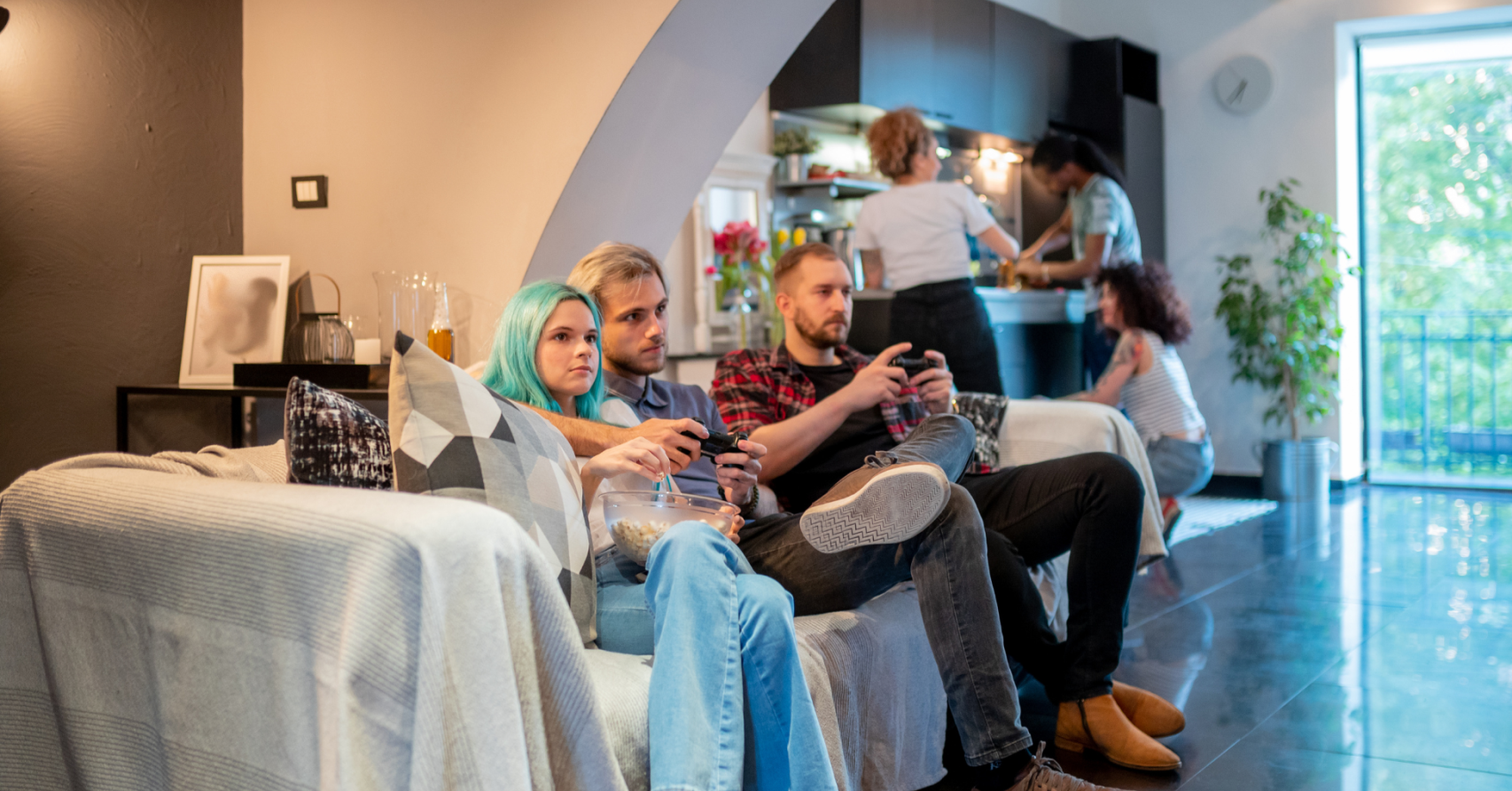Guide to Flatting in NZ

So you're thinking about flatting? Great choice! Flatting, or living with flatmates, is a common experience for many Kiwis, particularly young adults, as they transition from living with their parents to living independently. It can be a fun and exciting time, but it can also come with its own set of challenges. From finding the right flatmates to managing household expenses and dealing with conflicts, there are many aspects to consider when flatting.
In this article, we will explore all things flatting, including commonly asked questions, the pros and cons of a flat lifestyle, as well as our top tips for an enjoyable flatting experience! Whether you're a seasoned flatmate or embarking on your first flatting experience, this blog is here to help you make the most of your flatting situation.

General FAQs About Flatting
1. How much does flatting cost?
Let’s jump straight into the cost of flatting. Flatting can incur a number of different costs which are important to consider when deciding to move out. For some people it works out to be more cost efficient, while others may find they are better off living at home.
Rent - typically shared
First and foremost, there is the cost of rent. This will typically be split between the flatmates, with each person paying an equal share. It's important to budget for this expense as it will likely be your largest ongoing cost.
Utilities - typically shared
In addition to rent, there are other ongoing expenses such as utilities (electricity, gas, water), internet, and any other services you may require. Again, these costs will typically be split between the flatmates or one person may be responsible for each bill.
Bond - typically shared
It's also worth considering one-off costs such as a bond (usually equal to four weeks' rent) and any fees charged by the letting agency or landlord. You may also need to purchase household items such as furniture, kitchenware, and bedding, depending on what is already provided in the flat.
Repairs and maintenance - shared or personal
Finally, it's important to budget for unexpected expenses such as repairs or maintenance. As a flatmate, you will likely be responsible for contributing to the cost of fixing any damage caused by you or your flatmates
Note
There are a couple of things that can happen if you cause damage to your rental property:
→ If you cause damage to the rental property intentionally, and your landlord is covered for Deliberate Damage, they can lodge a claim to help repair the damages caused by you, the tenant. In saying this, it is likely they will try to recover these costs later down the line from you and will probably kick you out!
→ As of 2019, legislation was also passed so that tenants who cause careless damage to their rental property will be held liable for the cost of the damage in up to 4 weeks rent or the landlord's insurance excess.
The average Kiwi household can save
$2,023.79 a year by shopping their insurance!
Find out how your renewal prices stack up against other options out there!

Groceries - shared or personal
When you are flatting, it's important to consider groceries as a significant expense in your budget. Unlike when living with parents or in a dorm, you will need to purchase your own groceries and take responsibility for the cost of food. The cost of groceries can quickly add up, especially if you are not used to budgeting for them.
Tips:
→ Plan your meals and shop smart to make the most of your budget
→ Buy in bulk
→ Choose less expensive brands
→ Cook meals at home rather than eating out
→ Split grocery costs with your flatmates or take turns doing the shopping to ensure that everyone contributes fairly to household expenses.
Insurance - personal
Insurance should be considered an essential expense in your budget. While your landlord may have insurance for the property and damages, it's important to protect your own personal property and also have cover for unplanned situations such as natural disasters (e.g. floods, earthquakes, cyclones, etc.) that may require you to seek temporary accommodation elsewhere. Taking out contents insurance (personal liability is usually covered within) is a great idea. Jump to the section below to read more about what these cover.
Personal expenses - personal
It's important to consider personal expenses as part of your overall budget. Personal expenses can include things such as clothing, entertainment, personal care products, specific diet supplements and so on. While these expenses may seem small compared to rent and utilities, they can quickly add up and impact your overall financial well-being.
Tips
→ Create a personal budget
→ Create a monthly/weekly shopping list that accounts for items that would be shared and split the costs for these
→ Look for sales! It's time to start looking through mailers, signing up to newsletters, subscribing to your favorite retailers/services and following their socials. By getting alerted of sales, discounts, giveaways and promotional periods, you can take advantage of them which can help save a lot on costs.

2. What is the difference between flatting/boarding/renting?
Flatting
Flatting is when multiple people, often unrelated, rent a property together and share common areas such as the kitchen and living room. Each person has their own bedroom and may share other facilities such as bathrooms and laundry. Flatmates generally split the cost of rent and other household expenses.
Boarding
Boarding typically involves renting a room in a property where the landlord or owner also lives. Boarders usually have their own bedroom but may share other facilities such as bathrooms and living areas. Boarding arrangements can be more structured than flatting, with the landlord providing meals and other services in addition to accommodation.
Renting
Renting usually refers to a single tenant or family renting a property from a landlord. The tenant has exclusive use of the entire property, including bedrooms, living areas, and facilities such as bathrooms and kitchens. The tenant is responsible for paying the rent and utilities and may be required to sign a lease or rental agreement outlining the terms and conditions of the tenancy.

3. What is a tenancy agreement?
A tenancy agreement is a legal document that sets out the terms and conditions of a rental arrangement between a landlord and a tenant. The agreement will set out the rights and responsibilities of both the landlord and the tenant, and specify the terms of the tenancy, such as
→ The duration of the tenancy
→ The rent amount
→ Any restrictions on the use of the rental property
→ Any additional terms
Tenancy agreements must be in writing as they are deemed as a legal document. The landlord is also required to provide the tenant with a copy prior to the tenancy beginning.
4. What are some common disagreements amongst flatmates?
Rent and bills
At the top of the list, unsurprisingly, we have rent and bills. Conflict over these things can arise if one flatmate feels that another is not paying their fair share or is not contributing equally to shared expenses like electricity, water, and internet. Flatmates may also not be budgeting well and cannot pay their share towards rent and bills.
Cleaning and hygiene standards
Another super important one, which can be a make or break for flatmates, is differences in standards of cleanliness and hygiene. Some flatmates might be more meticulous and want everything spick and span, while others may be less concerned with the state of the living area, and as a result be a little more careless with cleaning and general hygiene.
Noise
It's quite simple. Some people prefer a quiet environment, more space and fewer people around, while others prefer a much louder environment, music playing all the time, having guests over or staying up at odd hours to watch TV and so on. If you are someone that likes maintaining a quiet environment, studies, or has to get up early, then having flatmates that are loud, enjoy staying up late and have a lot of gatherings will likely cause conflict down the line.

5. How do you resolve issues?
It may sound simple, but communication really is key.
→ It's important to talk openly and honestly as early on as possible if you start noticing you and your flatmates are not seeing eye to eye or if there is tension between people. At the end of the day, you don't want to be uncomfortable in a place you consider home, so talking it out quickly will help.
In saying this, we know it can be a bit awkward to address issues, so before you start flatting, or when looking for people to flat with, we recommend establishing a set of questions to ask potential flatmates in order to minimise the risk of running into issues later down the line.
→ Think about what's important to you, what makes you feel comfortable when living at home, what type of behaviour you would not be able to tolerate, or living standards you would not like to live in. By doing this you are way less likely to end up living with people who you don't get along with, or aren't on the same page with.
→ We compiled a list of questions at the end of this guide that would be useful to think about when looking for flatmates. Click here to see them.

Insurance-related FAQs About Flatting
1. Do I need insurance when flatting?
Having insurance may be something that is laid out in your tenancy agreement and your landlord may require you to have it, but if it's not set out, we would still say it is highly recommended to have. Of particular importance, contents insurance insurance is worth looking into.
Contents insurance
Contents insurance will cover your personal possessions, ranging from furniture, jewellery, electronic devices such as laptops, tablets, and smart watches and can also provide cover for sporting goods from bicycles to kayaks. If any of your belongings are stolen, lost or damaged due to events such as fire, flood, or theft, contents insurance can help cover the cost of replacing them. Remember that your landlord's insurance will not cover your personal belongings.
For example, if your flat gets broken into, and your laptop is stolen, your landlord will claim damages to the physical property (i.e. broken window), but not your laptop as it's not theirs or part of the property.
Contents insurance is also great as it usually includes personal liability cover. Personal liability cover provides coverage for damages or injuries you may accidentally cause to someone else or their property.
For example, if you accidentally spill your coffee on a friend's laptop or damage a fixture on the rental property, you could be held responsible for the cost of repair or replacement. Personal liability insurance can help cover those costs and protect you from pulling money from your own pocket.

2. Does my landlord's insurance cover my valuables?
No, it will not cover your belongings. Landlord insurance is taken out to safeguard the physical property and the landlord's interests. This can include the cost of repairing damages to the property or loss of rental income.
It is crucial to understand your tenancy agreement and inclusions and exclusions of your contents insurance should you choose to take it out. Different insurers will offer different policies, so it's important to compare your options in order to find the right cover for you.
Tip
→ Our Market Scan feature can quickly search for and compare contents policies from different insurers and let you know the benefits and price of each policy within a matter of minutes. You can then see which benefits some insurers include and don’t include compared to others, all at a quick glance. Try it here.
Shop smarter with Quashed
Insurance just got way easier with Quashed. Compare, shop and track all your insurance in one place.

3. Will my parent's or flatmate's insurance cover me while I'm flatting?
The terms of your parent's or flatmate's insurance policies will determine whether or not you are covered. Usually, insurance policies cover the named policyholders and their immediate family members or household residents, which may or may not include you.
Typically, if you are moving into university accommodation (e.g. halls of residence), your parent's contents insurance may extend a small amount of cover to you. However, in the instance of flatting, your parents insurance will not provide any cover. You will need to take out your own insurance policies to protect your personal belongings and liability.
The same applies for flatmates. If your flatmates take out a contents insurance policy, only their interests will be protected, not yours.
Moral of the story: Put on your grown-up pants and take out your insurance! If you're already making a very adult-y decision to move out, you’ll want to get it right and have an enjoyable experience living independently. And nothing is more enjoyable than the peace of mind that you can live your best life without having to worry about accidentally setting the flat on fire after a night out, right?
4. How much does contents insurance cost?
Like any insurance, the cost of contents insurance depends on many factors.
You'll notice that the cost tends to be higher when you are younger and a little cheaper when you are older. This can be for many reasons, but typically it’s a result of:
Younger people are statistically more likely to make claims as they are more prone to accidents or theft
Younger people tend to have less experience managing finances or maintaining homes (more likely to leave a door unlocked or a window open, in turn making them more vulnerable to theft)
Contents insurance prices also take into account the area in which you are residing. Some places are more prone to natural disaster or crime, and as a result, insuring the contents of these homes tend to pose a larger risk to insurance companies.
The table below shows the general trend of younger people being slightly more expensive to insure, and the region of Wellington costing slightly more to get contents insurance in, than someone getting contents insurance in Auckland.
$20,000 - Contents Sum Insured | $75,000 - Contents Sum Insured | |
|---|---|---|
20 year old living in Auckland | $58.82/month | $73.01/month |
20 year old living in Wellington | $64.75/month | $85.10/month |
35 year old living in Auckland | $50.71/month | $62.62/month |
35 year old living in Wellington | $55.79/month | $73.28/month |

Advantages of Flatting
Saving money
If your parents or caregivers would like you to start paying rent, it can sometimes be more than what the cost would be if you started flatting, therefore the money saving aspect is the probably biggest plus side. Almost all of the big costs are divided between all your flatmates which can make it a lot easier to live in a prime location or a nice place that you perhaps would not be able to afford on your own just yet.
Social life
Living with flatmates can be fun and a way to develop new friendships and networking connections. This is particularly advantageous if you are from a different city or living away from your family and friends. A lot of the time, you’ll end up meeting their friends and if you get along well with your flatmates you’ll probably find yourself going out with them instead of just hanging around with them at home. If you find the right flatmates it truly can be like a new family.
Sharing chores
An underrated bonus to flatting is the divvying up of chores and responsibilities. Not only is it great for your own life skills, but it also allows you to have more free time to focus on other aspects of your life such as study, a hobby or work.
Safety
Living with a few people can provide a sense of security, particularly if you are living in a foreign area. Living on your own can be quite daunting so having people around can help you to feel more secure.
Disadvantages of Flatting
Lack of privacy
Sharing common spaces such as the kitchen, living room and bathroom can be a bit much for people who value their personal space, or ability to control their surroundings. Even being in your own room can feel like you have a lack of privacy sometimes, depending what your flatmates are like and how big the property is.
Conflict with flatmates
For multiple reasons, arguments can occur between flatmates, particularly where there are differences in cleanliness, personality, lifestyle, schedules, preferences and so on. This is why it is important to take your time to find the right flatmates. Conflict with the people you live with can be an awful stress over your head, and with everything else you probably have going on in your life, having a negative, conflict-ridden living environment is not a disruption you’d want to deal with. And even if you proceed with caution to find good flatmates and conflicts still arise, remember communication is key.
Lack of control
If you are someone that struggles with compromising, then you are in for a rude awakening… When it comes to flatting, you will have to meet people halfway and find a middle ground on certain household decisions. Giving up some control over living space and lifestyle choices is something you may have to come to terms with. In this sense, you may feel a little less independent and struggle if you have specific preferences for the way you like things being done.

Tips for Flatting
1. Get your insurance sorted
Not to scare you but there are quite a number of flatting horror stories out there.
Some stories are about bad flatmates, some are about lack of insurance being in place, and sometimes they're about having bad flatmates that give you more reasons to need insurance. Theft coverage doesn't just mean someone breaks into your house; what if they are already inside?
The bottom line is that bad or unexpected things happen every day, and it is hard to fully trust people, especially if you have not known them for long. The risk will also start feeling greater when you realise you have to fend for yourself. Having insurance in place such as contents will help cover expenses which can crop up unexpectedly.
Without insurance, you would have to pay out-of-pocket to replace your belongings or compensate for damages. Peace of mind will always be there with insurance, and it’s often something flatters overlook, particularly if you are younger or have been living with parents or caregivers, as it may not have been something you dealt with but your caregiver certainly has.
It's also important to understand the location you are living in. What's the crime rate like? Is it in a high-risk zone for natural disasters? If so, make sure before moving in that your landlord does in fact have adequate and appropriate insurance in place for any circumstances that could arise!
2. Work out your budget
Even though you are saving money by splitting big costs, flatting can still be expensive, especially if your goal is to eventually own a house, save for a trip or if you simply have more expenses or lifestyle preferences. As a result, budgeting is super key for financial freedom and keeping stress-free. When creating your budget, make sure you are really accounting for all your expenses within a week/month.
Tip
→ Sometimes it can be hard to keep track of your expenses or maybe you are new to budgeting. Lucky for you, there are plenty of apps out there that make budgeting a breeze! Check out our blog on the best budgeting apps on the market right now so you can manage your money effectively.
3. Create flat rules
Having flat rules is something you should consider or ask your potential flatmates about. Having certain rules that are adhered to by all flatmates will help establish a comfortable and respectful living environment. It keeps everyone on the same page and is a healthy way of creating boundaries which will facilitate trust and positive relationships going forward.

4. Interview your potential flatmates
Establishing a set of questions to ask your flatmates before moving in is essential to ensure a comfortable and harmonious living situation. Living with flatmates can be a great experience, but it can also be challenging if expectations are not aligned. By asking questions about living habits, schedules, preferences, and boundaries, you can avoid potential conflicts and misunderstandings. For example, you might want to ask about noise levels, cleaning responsibilities, shared spaces, and guest policies. This conversation will help you understand your flatmates' lifestyles and values, and it will also allow you to communicate your own. Ultimately, a clear understanding of each other's expectations and preferences will lead to a more positive and enjoyable living experience for everyone involved.
Some questions to consider asking are:
→ How do they manage chores? Some places have a clear division of chores, some don't.
→ What costs do they expect to be split?
→ What do they consider reasonable power/water usage? Flatmates can run into arguments because of someone taking unusually long showers or leaving something on for too long that chews power.
→ If it's a situation where not everyone is on the tenancy agreement, how much notice is expected when you move out, and what happens if someone else moves out but you can't fill the spot? Is everyone expected to chip in or is it on the head tenant(s)?
→ Are you allowed overnight guests, and if so how many times a week is reasonable for everyone? Having a partner stay over is a very common issue for flatmates especially when they are using all the facilities but not paying.
→ What are everyone's work schedules like? Since you will be sharing facilities, it's good to know that you can work into your flatmates schedules so no one is running late or waiting for a shower to be free and so on.
→ Do social gatherings or parties occur often? If you are not into the party or social scene this may be an issue for you to tolerate.
Of course there are many other things to ask, especially around personality and preferences of flatmates, so make sure you think about things that are important to you and frame a set of questions around those.
Market Scan quotes are direct from insurers
So you won’t pay more with Quashed

